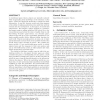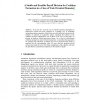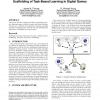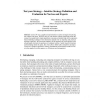689 search results - page 22 / 138 » Graphical Models for Game Theory |
126
click to vote
ATAL
2011
Springer
14 years 1 months ago
2011
Springer
We develop an algorithm for opponent modeling in large extensive-form games of imperfect information. It works by observing the opponent’s action frequencies and building an opp...
125
click to vote
SIGECOM
2006
ACM
15 years 7 months ago
2006
ACM
In traditional game theory, players are typically endowed with exogenously given knowledge of the structure of the game—either full omniscient knowledge or partial but fixed in...
101
click to vote
ATAL
2001
Springer
15 years 5 months ago
2001
Springer
In the last few years the use of coalition formation algorithms in multi-agent systems has been proposed as a possible way of modelling autonomous agent cooperation. Game theory pr...
117
click to vote
FDG
2009
ACM
14 years 11 months ago
2009
ACM
This poster describes a framework that automatically generates learning support scaffolds to guide task-based learning. The aim is to combine the exploratory learning principles p...
115
click to vote
GI
2009
Springer
14 years 11 months ago
2009
Springer
: ConnectIT uses a graphical representation to express strategies for playing the connect-four game. With this tool we can transfer complex knowledge about the connect-four game it...




